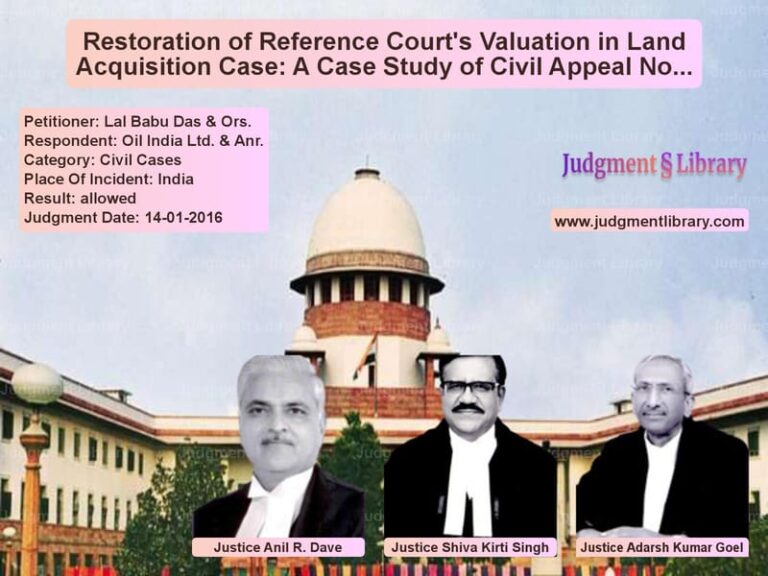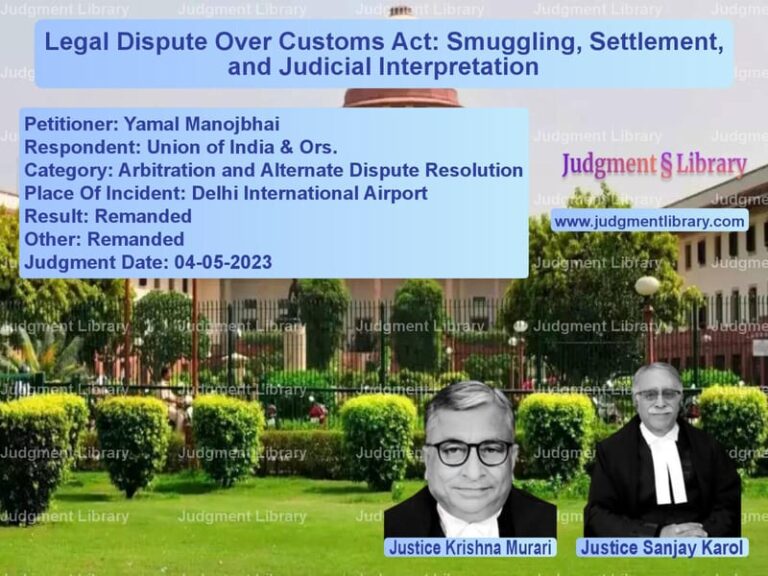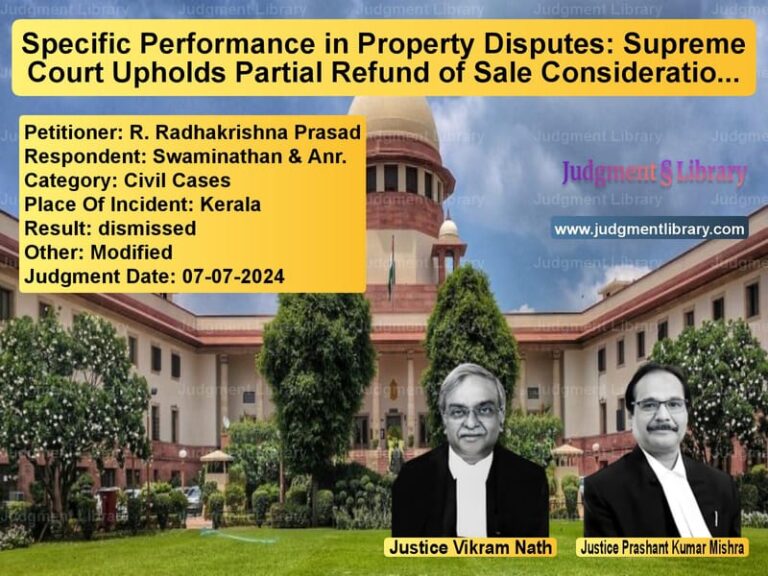Disproportionate Assets Case: Supreme Court Reinstates Corruption Charges Against Former Minister
The Supreme Court’s judgment in State represented by Deputy Superintendent of Police vs. K.N. Nehru & Ors., delivered on July 21, 2017, dealt with allegations of disproportionate assets against a former Minister of Transport in Tamil Nadu, K.N. Nehru. The case revolved around whether the trial court was justified in discharging the accused before completing the investigation. The Supreme Court overturned the High Court’s order of discharge and reinstated the corruption charges, directing the investigation to proceed.
The case was initiated following an FIR filed on September 15, 2011, by the Vigilance and Anti-Corruption Department, alleging that K.N. Nehru had amassed wealth disproportionate to his known sources of income. The prosecution claimed that during his tenure as Minister (from May 2006 to March 2011), Nehru and his family accumulated assets that increased from Rs. 2.83 crores to Rs. 18.52 crores. The Supreme Court ruled that further investigation was necessary before a decision on his guilt or innocence could be made.
Background of the Case
The allegations were based on Nehru’s tenure as Minister, during which his wealth allegedly saw a drastic increase. The prosecution contended that:
- May 13, 2006: Nehru assumed office as Minister of Transport.
- March 24, 2011: End of check period, during which assets increased significantly.
- September 15, 2011: FIR filed under the Prevention of Corruption Act, 1988.
- 2012: Charge sheet filed against Nehru and his wife.
- April 5, 2013: Trial court directed further investigation into his son’s financial dealings.
- December 19, 2013: Madras High Court discharged Nehru, citing insufficient evidence.
- July 21, 2017: Supreme Court reinstated corruption charges and ordered the continuation of the investigation.
Arguments by the Petitioner (State of Tamil Nadu)
The prosecution, represented by the Deputy Superintendent of Police, argued:
- The High Court erred in discharging Nehru before completing the investigation.
- Nehru’s explanation for his wealth was not sufficiently scrutinized.
- His son, who was claimed to have provided financial support, had not filed income tax returns, raising suspicions.
- The trial court was correct in ordering further investigation.
- There was prima facie evidence to proceed with the case.
Arguments by the Respondent (K.N. Nehru & Family)
The defense countered:
- Nehru had a lawful source of income and had provided explanations for his assets.
- His son’s financial contributions were legitimate and should not be grounds for prosecution.
- The prosecution had not produced sufficient evidence to warrant a trial.
- The High Court correctly found no basis for the allegations.
Supreme Court’s Observations
The Supreme Court, comprising Justices Arun Mishra and Amitava Roy, made the following key observations:
“The discharge of the respondents flies in the face of the direction for further investigation into the affairs of Arun in order to verify the lawfulness or otherwise of his source of income.”
“The High Court ought not to have recorded its findings of exoneration of the respondents at this stage.”
“The trial court’s order for further investigation was correct and should be implemented.”
Supreme Court’s Judgment
The Supreme Court ruled:
- The Madras High Court’s order discharging Nehru and his wife was set aside.
- The trial court’s direction for further investigation was reinstated.
- The prosecution must examine Nehru’s son’s financial records.
- The case should proceed based on fresh evidence collected.
Key Takeaways
- Judicial Caution in Discharge Orders: Courts should not prematurely exonerate accused individuals before a full investigation.
- Prevention of Corruption Act Enforcement: Public officials must be scrutinized for unexplained wealth accumulation.
- Significance of Income Verification: Courts require concrete evidence of income sources before ruling out financial misconduct.
- Balance Between Rights and Accountability: While accused individuals have a right to a fair trial, they must provide credible explanations for their assets.
Impact of the Judgment
The ruling has far-reaching implications for corruption cases:
- Reinforces the judiciary’s role in ensuring fair investigations before discharging accused persons.
- Strengthens the enforcement of the Prevention of Corruption Act.
- Encourages thorough scrutiny of financial disclosures by public servants.
- Provides a precedent for future disproportionate assets cases.
Conclusion
The Supreme Court’s decision in State of Tamil Nadu vs. K.N. Nehru underscores the need for due diligence in corruption investigations. By reinstating charges and directing further inquiry, the ruling strengthens legal accountability for public officials and ensures that financial misconduct cases are not dismissed without proper examination.
Don’t miss out on the full details! Download the complete judgment in PDF format below and gain valuable insights instantly!
Download Judgment: State represented by vs K.N. Nehru & Ors. Supreme Court of India Judgment Dated 21-07-2017.pdf
Direct Downlaod Judgment: Direct downlaod this Judgment
See all petitions in Money Laundering Cases
See all petitions in Fraud and Forgery
See all petitions in Bail and Anticipatory Bail
See all petitions in Judgment by Arun Mishra
See all petitions in Judgment by Amitava Roy
See all petitions in allowed
See all petitions in Remanded
See all petitions in supreme court of India judgments July 2017
See all petitions in 2017 judgments
See all posts in Criminal Cases Category
See all allowed petitions in Criminal Cases Category
See all Dismissed petitions in Criminal Cases Category
See all partially allowed petitions in Criminal Cases Category







